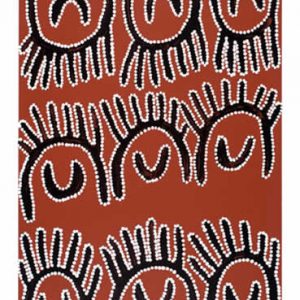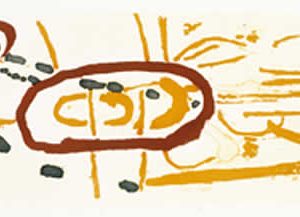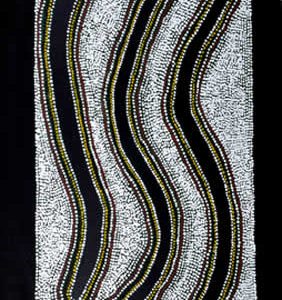Description
The country associated with this ‘ngapa Jukurrpa’ (water
Dreaming) is Mikanji, a watercourse west of Yuendumu that
is usually dry. There are ‘mulju’ (soakages) in this creek bed.
The ‘kirda’ (owners) of this Dreaming site are
Nangala/Nampijinpa women and Jangala/Jampijinpa men.
Mikanji is an important water Dreaming site, and features
in at least three different water Dreaming tracks.
In one story, the water Dreaming travelled from Puyurru,
northwest of Yuendumu, to a ‘mulju’ (soakage) in the
Mikanji creek. It unleashed a huge storm there. Two old
blind women of the Nampijinpa skin group were singing by
the side of the soakages. As the two women strained their
eyes to see the sky, tears formed in their eyes, creating the
rain. Their spirits can still be seen at Mikanji in the form of
two ‘ngapiri’ (river red gums) growing near the soakage.
A second water Dreaming track that passes through Mikanji
is also owned by the Nangala/Jangala and
Nampijinpa/Jampijinpa subsections, and travels further
west. At Mikanji, the storm rained so hard it created a hole
in the ground which became a soakage. At Mirawarri a
‘kirrkarlanji’ (brown falcon [Falco berigora]) picked up the
storm and carried it on its wings to the west until it became
too heavy for it. The falcon eventually dropped the storm at
Pirlinyarnu (Mt. Farewell) about 165 km west of Yuendumu,
where it formed an enormous ‘maluri’ (claypan). A ‘mulju’
(soakage) exists in this place today.
A third Dreaming track that passes through Mikanji is the
story of the water Dreaming and ‘pamapardu Jukurrpa’
(termite Dreaming). This Dreaming travels further north.
This water Dreaming is owned by Nakamarra/Napurrurla
women and Jakamarra/Jupurrurla men. The termite and
water Dreamings travelled together from Warntungurru in
the east past Warlura (a waterhole 8 miles east of
Yuendumu), Wirnpa, Kanaralji, Ngamangama, and Jukajuka.
A portion of this Dreaming track also includes the
‘kurdukurdu mangkurdu Jukurrpa’ (children of the clouds
Dreaming). The termite Dreaming moved on to the west to
Nyirrpi, a community approximately 160 km west of
Yuendumu, whereas the water Dreaming travelled on to
Mikanji. A ‘kirrkarlanji’ (brown falcon) eventually picked up
the water and tied it to its head using hairstring. The falcon
travelled north with the water Dreaming; at Puyurru, it flew
under a tree and the water fell off of its head, forming a
soakage there. The Dreaming then travelled on through
other locations including Yalyarilalku, Mikilyparnta, Katalpi,
Lungkardajarra, Jirawarnpa, Kamira, Yurrunjuku, and Jikaya
before moving on into Gurindji country to the north.
In contemporary Warlpiri paintings, traditional iconography
is used to represent the ‘Jukurrpa’ (Dreaming), associated
sites, and other elements. In many paintings of this
Dreaming, short dashes are often used to represent
‘mangkurdu’ (cumulus & stratocumulus clouds), and longer,
flowing lines represent ‘ngawarra’ (flood waters). Small
circles are used to depict ‘mulju’ (soakages) and river beds.





